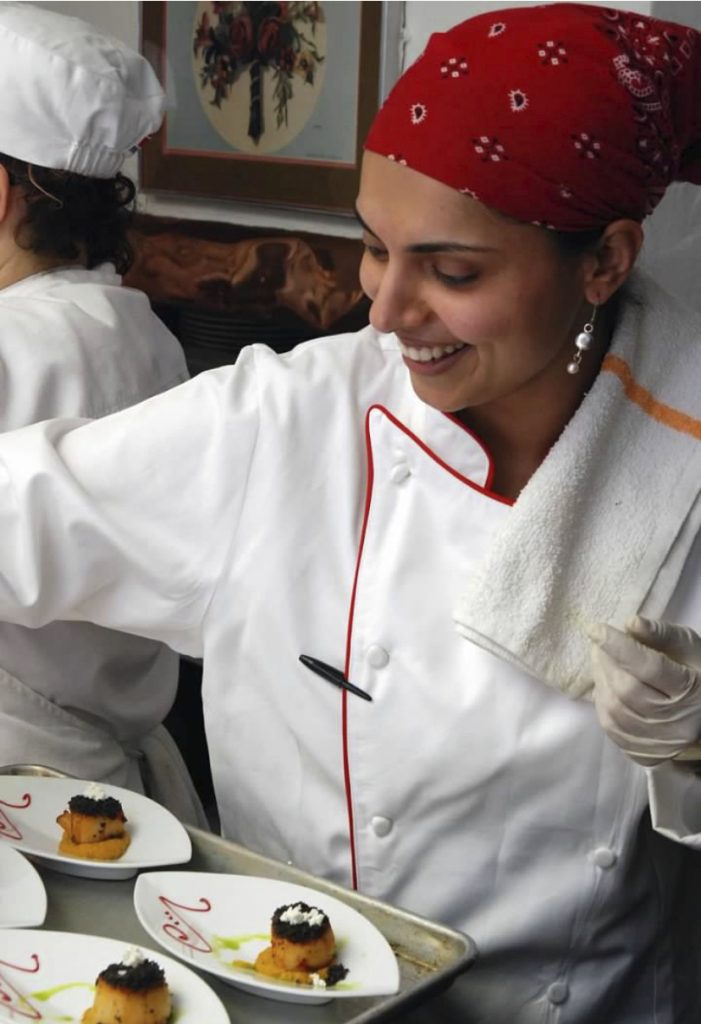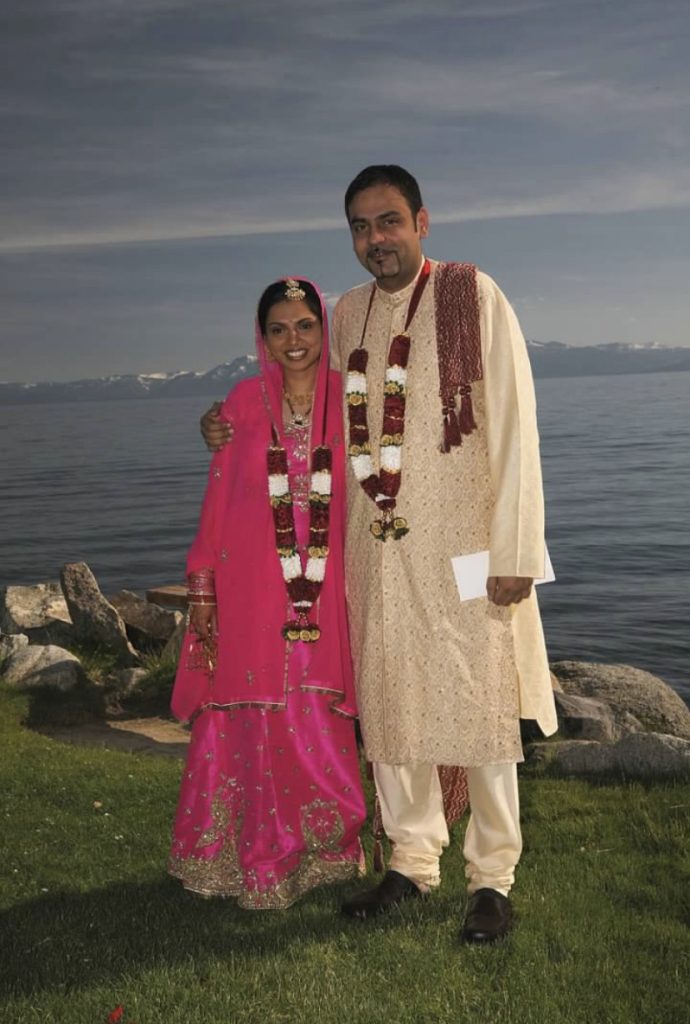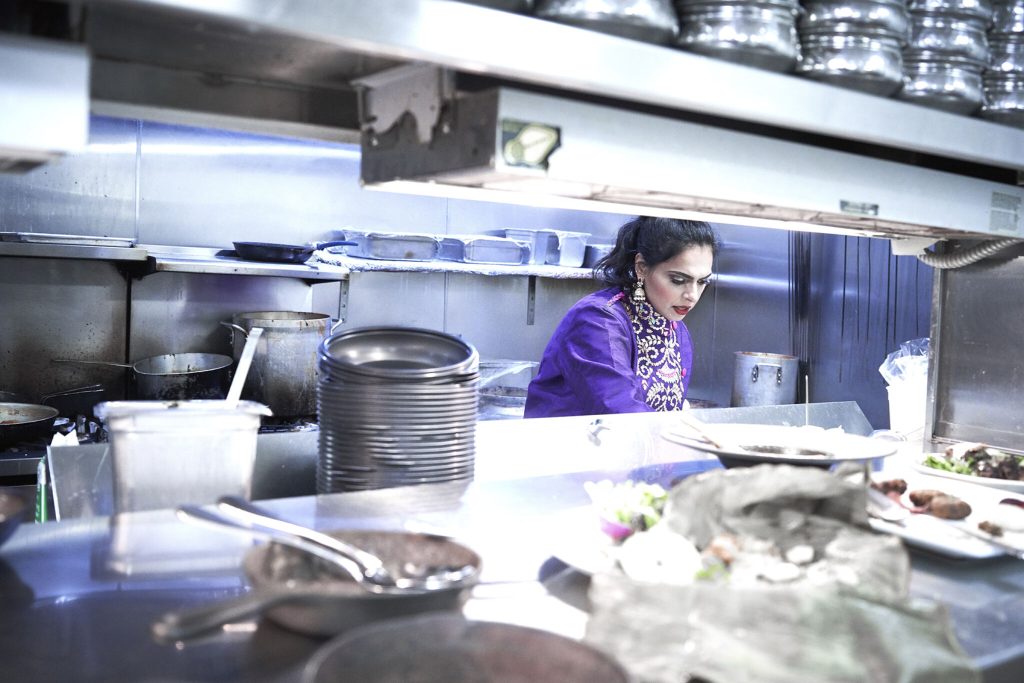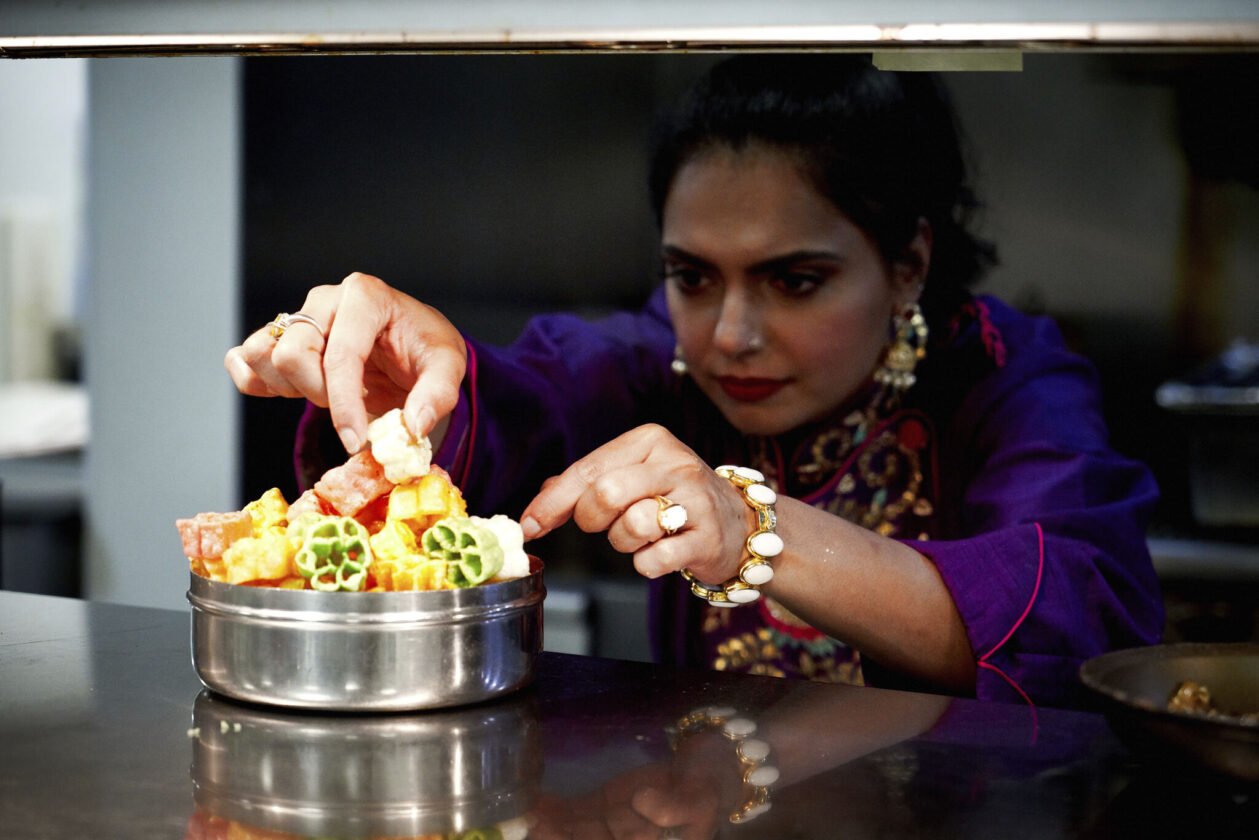Before she was a judge on Food Network’s famed cooking competition show Chopped, Maneet Chauhan was a competitor herself on Iron Chef America. She went up against powerhouse chef Masaharu Morimoto—something she had been dreaming about since was in culinary school.
“He’s one of the original Iron Chefs. And when I was at CIA [The Culinary Institute of America] we used to watch Iron Chef, and we’re like, ‘Oh my God, we need an opportunity to compete against him.’ And in that competition as I always tell everybody, I came a respectable second, among two people,” Chauhan says, laughing.


It was this experience that began her Food Network career, where she would later be invited to compete on The Next Iron Chef, a competition show where chefs compete to become one of the culinary giants. Ultimately, this progression is what led her to Chopped, along with judging other shows on Food Network, such as Guy’s Grocery Games.
But outside of her illustrious TV career, Chauhan is an entrepreneur. She and her husband, Vivek Deora, founded Morph Hospitality Group in Nashville, Tenn., which houses her four restaurants. Morph Hospitality Group came about seven years ago, after Chopped had taken off.
“We get a phone call from Nashville, and they were like, ‘Hey, would you like to open something in Nashville,’ and when we came to Nashville what we really fell in love with was the opportunity that the city afforded us,” Chauhan explains. “It was an opportunity. Like, we could set up some things like Chauhan Ale & Masala House, which was our first restaurant. There was nothing like that here in Nashville. And we realized that that would be a great place because people already had started moving over here, and they were clamoring for something different, something unique. And we thought that we could get it and that would help us create a niche for ourselves.”


From here, Chauhan says they began determining the gaps in the “culinary tapestry,” leading them to open the first upscale Chinese restaurant (that wasn’t a P.F. Chang’s) in the area. They also partnered with renowned chef/manager duo Brian Riggenbach and Mikey Corona to open The Mockingbird. And now the hospitality group has four restaurants to its name, including Chauhan Ale & Masala House. Independent from Morph, Chauhan and Deora also own a brewery called Life Is Brewing.
“One of the biggest challenges with Indian food is the beverage list,” Chauhan says. “Everyone thinks to pair Indian food with something really sweet so it will tame the spicy, but really it should be about complementing the flavors. It was from that idea that we decided to brew beers with spices in it and that’s how Life Is Brewing came to life, which has brews such as saffron cardamom IPA, or chai porter. And actually, Condé Nast named the saffron cardamom IPA as one of the seven best beers across the world.”
What started as a small brewery soon grew into what Chauhan says is the largest brewery in Tennessee and perhaps the South, sitting on 83 acres of land in Murfreesboro, Tenn. and now brewing beers for not only Life Is Brewing’s brand, but two others, as well.
Unlike some chefs, Chauhan was prepared to be an entrepreneur from the start. Prior to attending culinary school at CIA, she earned a Bachelor’s degree in hospitality management back in India, where she is originally from. And while she says this education really helped her, she admits that going from being a chef to being an entrepreneur can be quite a transition.
“It definitely was a switch because as a chef you’re only looking at one micro level of the entire organization, which is the kitchen,” Chauhan says. “You are looking at controlling the costs, you’re looking at making the best food, you’re looking at putting your best in front of everybody. But as a restaurant owner, you have to not only look at you know the front and the back, but you have to also set up goals for yourself, they have to be projections, they have to be the constant balancing of sheets, you’ve got to figure out what are the different aspects that you’re cutting costs, you’ve got to figure out how your top line is going to go higher. So there is all of that aspect, which, which is very exciting. So you just realize that your small world of the kitchen just expanded to a bigger world.”
But even the best entrepreneurs and restaurateurs could not have expected COVID and how swiftly it would require businesses to adapt to a largely remote, digital world. And though it was difficult for Chauhan and her restaurants, especially as they had been beating projections for four years and were thinking 2020 would be their best year yet, she has a positive outlook on how COVID has impacted her businesses.
“It was definitely very, very difficult. And I think more so because of the fact that we had, like I was talking about projections, we got into 2020 with that entire heady feeling that this is going to be our best year ever. Like, we were beating projections for the last four years,” Chauhan says. “So I think it kind of hurt us a little bit more in terms of, like the expectations versus reality, as my daughter was constantly saying. It was very difficult, but being in Nashville, it is definitely a little bit different from what it is with, you know, when I talk to my friends who are on either of the two coasts. We anticipated this happening. And we did the closure before it was mandated because first of all, the safety of our team members and our guests was paramount for us, and also we wanted to make sure that with the entire team we like, if they needed to file for unemployment or whatever they wanted to do. Very early on, we realized that our entire strategy would be to sustain because if we would have just even dragged being open for another week, the ability or the chances of us not opening again would have been very high, which is going to happen with a lot of restaurants right now because nobody knows how long this craziness is going to last…And then we started coming up with a lot of ways in which we can get revenue in, it was all of us partners we were all hands on deck, you know on deck. We were doing what needed to be done, we started doing takeout, we started shipping stuff. So I think this did result in us being a lot more creative than we would have to be, which I think is an advantage, but it definitely was not an easy time and still now is not an easy time for us.”
COVID has clearly presented major hardships for the hospitality industry, and women have faced hardships in the male-led field for quite some time, but the pandemic certainly didn’t help. Over 2.2 million women left the workforce, and CNBC reports that women accounted for 52 percent of the leisure and hospitality workforce, contributing at least in part to why so many women were laid off in the last year.

Beyond that, Chauhan finds that the food and restaurant industries are still male-dominated, but also that she has seen the industry change a lot in this regard, and it is continuing to change.
“It’s nothing that’s going to happen overnight, which I think all of us need to realize,” she says. “It needs to change organically, and how that happens is, at least in my estimation, when the younger generation starts seeing more and more women in the industry succeed. So that I think is very important, to just get the new generation involved, [get the] new generation excited—that this is an industry in which you can get success and fame.”
When asked if she or any women she knows in the industry have faced specific challenges because of their gender, Chauhan noted the difference between being a female chef in America and being a female chef in India.
“I am a slightly difficult person to ask this question because I came from India. And in India I literally did my externship in kitchens where I was the only girl in a kitchen of around 60 to 70 men,” she says. “And so to me when I came over here and I would find even another female chef, to me I would be like, ‘Oh, we are already so far ahead of the game.’ So I find that question slightly difficult only because I literally came from a place where people will literally [be] like, ‘Oh you’re learning, you’re in the kitchen trying to be a chef because you want to learn how to cook for your husband.’ So, yeah. So like the bar was so low for me that anything beyond that was higher.”
When it comes to making progress for women in the industry, Chauhan says that it’s important for women to keep pushing each other in order to make strides. She also mentions that mentorship is very important so as to be able to exchange stories of successes and failures and answer questions for those interested in pursuing a career in hospitality.







